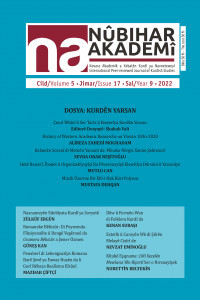Eschatology and Afterlife: Eschatological Examples in Kurdish Texts and the New Versions of “Beyta Sekeratê
Eschatology and Afterlife: Eschatological Examples in Kurdish Texts and the New Versions of “Beyta Sekeratê
Eschatology, Death, Mythology, Theology Apocalypse,
___
- Açıkgenç, Alparslan. (1995). “el-Esfârü’l-Erbaa.” Diyanet İslâm Ansiklopedisi. cild: 11: 374-376.
- Babacan Bursalı, Meryem. (2018). “Cümcüme Sultan Hikâyesi’nin Kökeni Üzerine Bir Giriş Denemesi ve Anlatının Mensur Bir Yeniden Yazım Örneği.” Türk Dili ve Edebiyatı Dergisi. (58). 2: 247-280.
- Batuk, Cengiz. (2001). “Ortadoğu Dinlerinde Eskatoloji Mitosları.” Samsun: Ondokuz Mayıs Unv, Sosyal Bil. Enst. (Teza Lîsansa Bilind ya Çapnebûyî).
- Bible. “Genesis”: https://www.biblegateway.com/passage/?search=Genesis%2028&version=NIV (tarîx: 02.12.2021).
- Cotkar. (1988). “Efsana Cimcimê Sultan.” Rewşen. 1: 56-58.
- Çelebi, İlyas. (2019). “Tezkiretü’l-Kurtubî.” Diyanet İslâm Ansiklopedisi. cild: Ek-2: 595-596.
- Çiftoğlu Çabuk, Arzu. (2018). “Cümcüme Sultan Hikâyesinin İlk Mensur Türkçe Çevirisi.” İdil. (7) 48: 897-908.
- Dante Alighieri. (2020). İlahi Komedya. (Wer.: Sevinç Elpida Kara & Seçkin Erdi). İstanbul: Alfa.
- Dastanî Sultan Cumcume. (2014). (Amd.: Muhemmed Reşîdê Emînê Paweyî, Karwan Osman Xeyat (Rêbîn)). Silêmanî: Înstituyî Keleporî Kurdî-Silêmanî.
- Eliade, Mircea. (2003). Dinler Tarihine Giriş. İstanbul: Kabalcı Yayınları. [neql ji: Özbek Arslan 2019].
- Erdi, Seçkin. (2020). “Ölmeden Önce Ölmenin ve Yeniden Doğmanın Yolculuğu: Dante’nin Komedya’sı.” 5-21. [di nav: Dante Alighieri 2020].
- Ergin, Ramazan. (2011). “Süryani Dilsel İşaretlerle Yazılmış Kürtçe İlahiler (Lawij-Gerşuni) Kürt Mesihiler Ya Da Midyatlı Kürtçe Konuşan Mesihiler; Süryani Dilsel İşaretli Kürtçe İki İlahinin Teolojik ve Dilbilimsel İçeriği.” Uluslararası Midyat Sempozyumu. Mardin: Mardin Artuklu Üniversitesi.
- Evdiselamê Xalidî Zîbarî. “Beyta Olî/Qiyametê.” Kurdax: https://cankurd.wordpress.com/2011/02/24/beyta-oli/ (tarîxa gehandinê: 15.10.2021).
- Feqe Reşîd. (2020). Sirru’ul-Mehşer. (Amd.: Ahmet Gemi, M. Nazif Katılmış). Wan: Peywend.
- Feqe Reşîdê Koçer. (2002). Sirrul Mehşer. (Tîpguhêzî: Osman Akdağ, Kerem Soylu). İstanbul: Weşanên Enstîtuya Kurdî ya Stenbolê.
- Feqî Reşîdê Koçer. (2014). Sirul Mehşer. (Amd.: Rênas Jîyan). Amed: Weşanxaneya Belkî. [Neql ji Feqe Reşîd 2020].
- Gemi, Ahmet. (2018). “Çend Agahî Derheq Jiyana Feqe Reşîd û Sirru’l-Mehşera Wî de.” Nûbihar Akademî. (3) 9: 117-130.
- Gennep, Arnold Van. (1906). Mythes et Légendes d’Australie. Paris: E. Guilmoto. [neql ji: Özbek Arslan 2019].
- Gılgamış Destanı. (1973). (Wergêrana bo Ingilîzî: N. K. Sandars). (Wergêran ji Ingilizî bo Tirkî: Sevin Kutlu & Teoman Duralı). İstanbul: Hürriyet.
- Gılgamış Destanı. (1998). (Wer.: Muzaffet Ramazanoğlu). Cumhuriyet.
- Harman, Ö. Faruk. (2013). “Ya‘kûb.” Diyanet İslam Ansiklopedisi. 43: 274-276. [https://islamansiklopedisi.org.tr/yakub].
- Mela Yasîn Yusrî. (2011). Baxçeyê Jiyana Piştî Mirinê. (Amd: Muhammed Topraq). İstanbul: Nûbihar.
- Özbek Arslan, Necmiye. (2019). “Ardavirafnâme ve Miraçnâmelerde Yükseliş Mitinin İncelenmesi.” Akademik Dil ve Edebiyat Dergisi. (3) 4: 420-446.
- Prim, Eugen; Socin, Albert. (1988). “Cimcima Sultan.” Rewşen. 1: 59-60.
- Sandars, N. K. (1973). “Giriş.” 7-62. [di nav: Gılgamış Destanı 1973].
- Şêx Nûreddînê Birifkanî. (2001). Zibanê Kurdî: Dîwana Şêx Nureddînê Birifkanî. (Amd.: Zahid Birifkanî). Stockholm: Weşanên Roja Nû.
- Şêx Nûreddînê Birifkanî. (2002). Zebanê Kurdî: Dîwana Şêx Nureddînê Birifkanî. (Amd.: Zahid Birifkanî). Hewlêr: Aras.
- Şêlazî, Cemîl Mehemed. (Berhevkar). (?). Hindek Beytên Kurdî Ji Destnivîsên Mela Mistefa Oremarî (1920-1994). Duhok.
- Şêlazî, Cemîl Mehemed. (2001). “Beyta Sekeratê” Vejîn. jimar: 22: ??.
- Utas, Bo. (1377). “Sefer be Cihan-i Dîger, der Surayiş-i Kuhen-i Parsî. Îranşinasî. (wer: Daryûş-i Karger). sal: 10. hj: 38: 311-324.
- Yıldırım, Nimet. (Wer.). (2019). Ardâvîrâf: Ardâvîrâfnâme: Cennet, Araf ve Cehennem. İstanbul: Pinhan.
- Zapsu, Abdurrahim. (1985). Cenaze ve Temizlik Ahkâmı. İstanbul: Ehl-i Sünnet.
- ISSN: 2147-883X
- Yayın Aralığı: Yılda 2 Sayı
- Başlangıç: 2014
- Yayıncı: PAK AJANS Yayıncılık
Mîr-i Aşiretten Eşkıyalığa: Aşiret Hanedan Üyelerinin Makbulden Madunlaşma Sürecine Bakış 1800-1855
Faqe Qadri Hamawand in Qajar Documents
Hemawend Tribe According to Unpublished Documents
Kurdish Self-Determination, Turkish Anxiety: The Making of the Republican Raison D'état
A Review of Mela Mahmoudi Bazidi’s Tuhfetu’l-Khullan fi Zimani Kurdan
Siyaset Bilimi Bağlamında Stranların Toplumsal Etkisi: Nasturi ve Kürt Stranları Örneği
DENGBEJLERİN KILAMLARINDA MUŞLU MUSA BEY İLE GÜLİZAR’IN HADİSESİ
